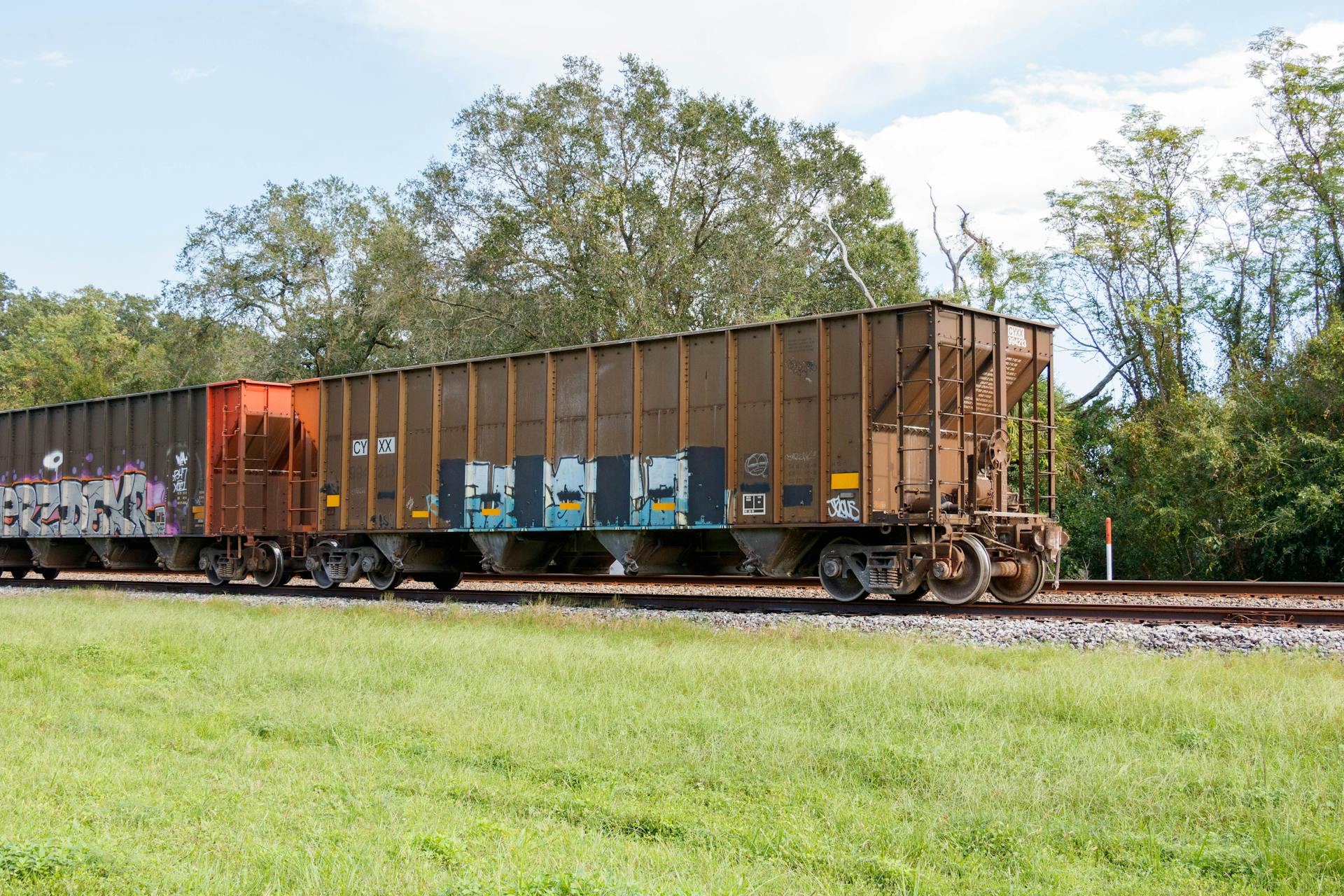
In Florida, weigh stations are essential for ensuring the safety and compliance of commercial vehicles. Florida's weigh stations are open 24/7 and are located near major highways and interstates.
If you're planning to visit a weigh station in Florida, it's crucial to know the rules and regulations beforehand. The Florida Department of Highway Safety and Motor Vehicles (DHSMV) requires commercial vehicles to stop at designated weigh stations for inspections.
Commercial vehicles with a gross vehicle weight rating (GVWR) of 10,001 pounds or more are subject to weigh station inspections in Florida. This includes trucks, buses, and other large vehicles.
For your interest: Pony Express Stations
Florida Weigh Station Rules
Florida has strict rules regarding commercial truck weight restrictions. These restrictions are in place to prevent damage to highways and ensure driver safety.
Highways are designed to withstand a certain amount of weight, so driving on them with weight over this limit can cause the road to break apart prematurely, creating a hazardous surface for other drivers and increasing maintenance costs for the state.
Trucks that exceed weight limits can be pulled over at weigh stations for further inspection. These inspections can result in penalties, fines, and delays.
Weigh stations use weight-in-motion systems, which include sensors placed on the road's surface to weigh trucks as they drive over them. Trucks within an acceptable weight range are green-lighted, while those outside the threshold are red-flagged.
Some of the weigh stations in Florida include Flagler, Madison, Martin, Pensacola, Punta Gorda, Seffner, Sneads, White Springs, Wildwood, and Yulee.
Trucks are required to stop at weigh stations to undergo inspections and verify compliance with weight limits and safety standards.
Explore further: Do Trucks Have to Stop at Every Weigh Station
Weight Limits and Restrictions
Florida's weight limits and restrictions are in place to protect the state's highways and bridges from damage. The maximum weight allowed for all vehicles driving on Florida highways is 80,000 pounds.
The state imposes weight limits because highways are designed to withstand a certain amount of weight, and driving on them with weight over this limit can cause the road to break apart prematurely.
Readers also liked: State Weigh Station Laws
Commercial trucks have specific weight limits, including a maximum weight of 22,000 pounds for a single axle and 44,000 pounds for a tandem axle.
To help enforce these weight limits, the Florida Department of Transportation follows the Motor Carrier Size and Weight Program, which aims to protect Florida's highways and bridges from damage.
Here are some key weight limits to keep in mind:
- Gross Vehicle Weight – 80,000 pounds
- Single Axle – 22,000 pounds maximum
- Tandem Axle – 44,000 pounds maximum
Commercial Vehicle Restrictions
Florida has specific rules for commercial vehicles, and it's not just about size. The state has weight limits to prevent highways from breaking apart prematurely.
Highways are designed to withstand a certain amount of weight, and driving on them with weight over this limit can create a hazardous surface for other drivers. This also increases maintenance costs for the state.
The Florida Department of Transportation (FDOT) enforces maximum weight limits through the Motor Carrier Size and Weight Program. This program aims to protect Florida's highways and bridges from damage.
Commercial truck drivers must consider weight limits in addition to size restrictions when operating on Florida highways.
Maximum Weight Allowed
The maximum weight allowed on Florida highways is a crucial aspect of road safety and maintenance. Commercial trucks are subject to strict weight limits to prevent damage to the roads and bridges.
The gross vehicle weight, which includes the weight of the vehicle and load, cannot exceed 80,000 pounds. This is a critical limit that all commercial trucks must adhere to.
Single axle vehicles are limited to a maximum weight of 22,000 pounds, while tandem axles can weigh up to 44,000 pounds. These limits are in place to prevent excessive wear and tear on the roads.
Here's a breakdown of the maximum weight limits for commercial trucks in Florida:
- Gross Vehicle Weight: 80,000 pounds
- Single Axle: 22,000 pounds maximum
- Tandem Axle: 44,000 pounds maximum
It's worth noting that the maximum weight limits vary depending on the distance between the first and last axle of the vehicle. The farther apart the axles, the more weight the vehicle is allowed to carry.
Weigh Station Locations and Operations
Weigh stations in Florida are equipped with weight-in-motion systems that use sensors to weigh trucks as they drive over them. These sensors are sophisticated and can detect the axel spacing to determine the truck's weight class correctly.

There are several weigh station locations throughout the state, including Flagler, Madison, Martin, Pensacola, Punta Gorda, Seffner, Sneads, White Springs, Wildwood, and Yulee.
Trucks that are within an acceptable weight range are green-lighted and allowed to continue driving, while trucks that fall outside of the threshold are red-flagged and pulled to the side for a more accurate weighing and inspection.
Static weight stations are located on the side of interstate highways and require trucks to pull off the highway onto an access road and onto large-scale plates when it's their turn.
There are 20 fixed weigh station locations in Florida, with 10 of them being Weigh in Motion (WIM) type and 10 being static type.
Here's an interesting read: How Much Does a Loaded Tractor Trailer Weigh
Compliance and Enforcement
Commercial trucks are required to stop at weigh stations to undergo inspections and verify compliance with weight limits and other safety standards. These inspections help ensure the safety of Florida's roads and drivers.
The Federal Motor Carrier Safety Administration (FMCSA) and state-level authorities like the Florida Department of Transportation (FDOT) conduct inspections, review records, and investigate complaints to enforce federal trucking regulations. They also maintain databases to track compliance records and monitor safety ratings.
Non-compliance with weigh station regulations can result in penalties, fines, and further inspections that may delay deliveries and impact the trucking company's operations. This highlights the importance of adhering to weight restrictions and safety regulations.
FDOT's Motor Carrier Size and Weight (MCSAW) program is responsible for enforcing commercial vehicle size and weight regulations in Florida. They have 20 fixed weigh station locations, including 10 Weigh in Motion (WIM) type and 10 static type facilities.
On a similar theme: Mail Carrier Rules and Regulations
Frequently Asked Questions
What vehicles have to stop at weigh stations in Florida?
In Florida, commercial vehicles with a gross vehicle weight rating (GVWR) of 26,011 pounds or more are required to stop at weigh stations. These include trucks, buses, and RVs, but private vehicles are exempt.
Sources
- https://www.rhinolawyers.com/commercial-truck-weight-enforcement-in-florida/
- https://www.clickorlando.com/traffic/2023/09/21/ask-trooper-steve-who-has-to-stop-at-a-weigh-station-in-florida/
- https://www.flhsmv.gov/florida-highway-patrol/commercial-vehicle-enforcement/safety-enforcement/weight-enforcement/
- https://www.thetruckersreport.com/truckingindustryforum/threads/how-does-a-florida-weigh-station-work.1258776/
- https://dwpersonalinjurylaw.com/federal-trucking-regulations-and-enforcement-in-florida/
Featured Images: pexels.com


